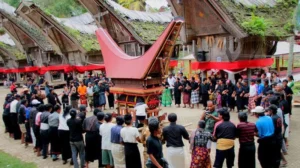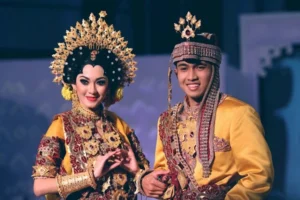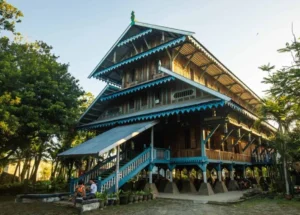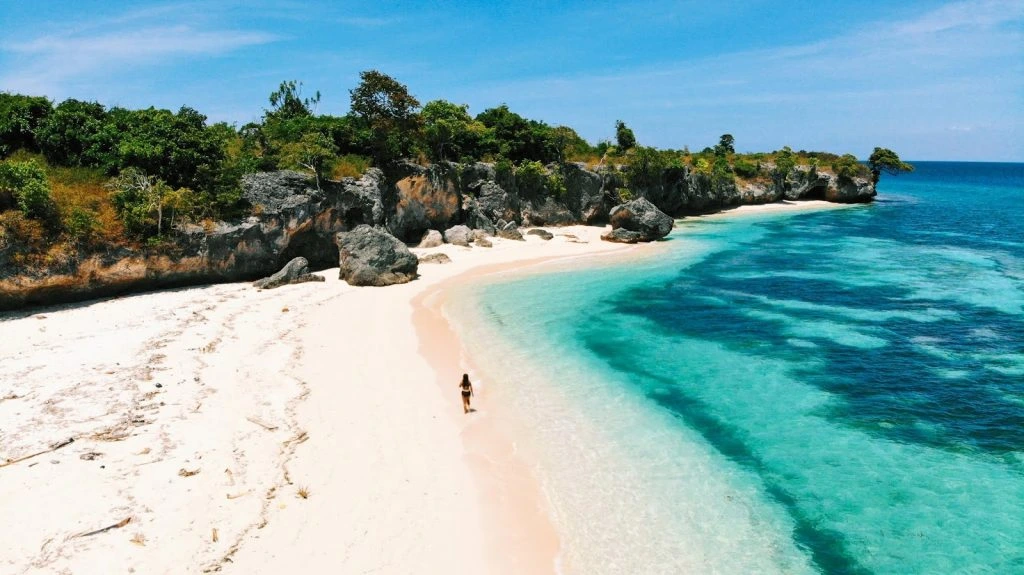Sulawesi, as the largest island in Indonesia, is indeed an impressive destination not only for its natural beauty but also for its extraordinary cultural richness. One aspect that makes Sulawesi so special is its rich and unique customs and traditions. By exploring the cultural wealth of Sulawesi, we can discover seven customs that reflect cultural diversity and an impressive history.
Through the exploration of these 7 Customs of Sulawesi, we can appreciate the unforgettable charm of cultural diversity and history deeply rooted in each Sulawesi community. Sulawesi is not just a tourist destination with captivating natural landscapes, but also a cultural offering that enchants every visitor with its uniqueness.
7 Customs of Sulawesi
1.Toraja: Meaningful Celebration of Death
source : pinterest.com
The Customs of Sulawesi, especially during funeral ceremonies in Toraja, showcase cultural richness and deep spirituality. Funerals in Toraja are not only a ritual to remember the deceased but also a celebration of life marked by respect for ancestors. These funeral rituals include a series of steps reflecting the uniqueness of Sulawesi customs.
From the funeral procession filled with religious symbols to traditional dances illustrating the artistic and cultural richness, all these elements showcase the diversity and beauty of South Sulawesi customs. In the context Customs of Sulawesi , funeral ceremonies are not just an empty tradition but also a means to maintain spiritual connections with the spirit world.
The Toraja community believes that through these ceremonies, ties with ancestors remain intact, and the souls of the deceased continue their journey in peace. The use of religious symbols and various types of offerings in funeral rituals is an integral part Customs of Sulawesi, strengthening the bonds between humans, nature, and ancestors.
2.Bugis: Strong Kinship System
source: homecare24.id
The Bugis society in South Sulawesi takes pride in its not only complex but also very strong kinship system. This system is not just a formal rule but the foundation governing various aspects of Bugis social, economic, and political life. Fundamental values such as loyalty, honesty, and respect for parents are the pillars of daily life in this community.
Customs of Sulawesi, as expressed in the daily life of the Bugis, demonstrate the power of the influence of traditional values on social structure. A notable tradition among the Bugis is the traditional wedding ceremony. The Bugis wedding ceremony is not just a ritual but reflects the belief in the importance of family ties and generational continuity.
This tradition shows how important family is in Bugis culture, where kinship ties are not just links between individuals but also the foundation of Bugis society as a whole. Thus, Sulawesi customs, especially in Bugis society, illustrate the harmony and balance between traditional values and the dynamics of modern life.
3.Minahasa: Unique Naming Ritual
source: pinterest.com
The Minahasa community in northern Sulawesi upholds a unique tradition related to passing down names from generation to generation. The process of giving a name is not only the responsibility of parents but involves a specific ritual called “Mapalus.” In this ritual, the Minahasa community calls upon a healer or priest with a special role in assigning names based on natural events or specific signs.
These Customs of Sulawesi reflect the connection between humans and nature, where each name has a deep meaning related to the environment. Giving a name through the Mapalus ritual is considered to have a deeper significance in the life of the Minahasa community. Names assigned through this ritual are believed to bring protection and success in the life of the individual.
This belief reflects the close bond between the Minahasa community and the cultural and spiritual heritage rooted in Sulawesi customs. Thus, the Mapalus ritual is not just a preserved traditional aspect but also an essential part of shaping the identity and beliefs of the Minahasa community in northern Sulawesi.
4.Makassar: Magnificent Traditional Weddings
source: grosirkebaya.net
Customs of Sulawesi shine again in the tradition of weddings in the Makassar community in South Sulawesi. Wedding ceremonies in Makassar are not just the union of two individuals but a celebration of beauty and symbolism reflecting the cultural richness of the region. A series of rituals, such as the meaningful exchange of rings and fascinating traditional dances, showcase the uniqueness Customs of Sulawesi in the context of marriage.
Through this ceremony, the Makassar community perpetuates values of companionship, loyalty, and respect for ancestors, which are the strong foundations of community life. The importance of Customs of Sulawesi in Makassar weddings is also reflected in the choice of traditional attire for the bride and groom. Traditional clothing is not just elegant attire but also carries deep symbolic meaning.
Every detail and pattern on traditional clothing contains messages connecting the newlyweds to the values of life and Sulawesi culture. Thus, the wedding ceremony in Makassar not only celebrates the love and union of couples but is also a concrete effort to preserve and respect Customs of Sulawesi, an inseparable part of the local identity.
5.Gorontalo: Rich Marine Culture
source: mediasiana.com
Sulawesi customs manifest again through the rich marine cultural heritage of the Gorontalo community in the northern coastal region of Sulawesi. The tradition of navigation and fishing is a precious legacy passed down from generation to generation in this community. The combination of navigation skills and knowledge of the sea forms a unique culture that is the distinctive identity of the Gorontalo community.
The Gorontalo Sea Festival is a celebration that illustrates this cultural richness, creating a moment where the population celebrates marine life, respects the sustainability of resources, and celebrates their close connection with the sea. The Gorontalo Sea Festival is not just a ceremony but also an appreciation of the diversity of marine life and the lives of coastal populations. In this festival, Sulawesi customs are reflected through dance, music, and artistic exhibitions exploring marine themes.
The Gorontalo community uses this festival as an opportunity to strengthen social bonds and respect the local wisdom that colors their daily lives. Thus, the Gorontalo Sea Festival not only promotes the beauty of the sea and resource sustainability but is also a concrete expression of the pride of the Gorontalo community in its rich and unique marine cultural heritage.
6.Bajo: A Nomadic Marine
Society manifest in the life of the maritime community of the Bajo people, spread across different islands of Sulawesi. This nomadic community is known for its life on the water, living in stilt houses that harness the wealth of the sea as their main source of life. High navigation skills and closeness to the sea are distinctive features of the Bajo community, allowing them to skillfully explore the waters of Sulawesi.
Customs of Sulawesi are reflected in the various traditional ceremonies of the Bajo people, closely linked to maritime activities dominating their lives. Rituals before venturing into the sea are integral to Sulawesi customs experienced by the Bajo people. Before engaging in navigation and fishing activities, they celebrate traditional rituals as a sign of respect for the sea and to seek the safety of their journey. Similarly, the celebration of catches is an important moment celebrated with joy and gratitude.
Through this tradition, the Bajo people maintain a harmonious relationship with the marine environment, in accordance with the beliefs and Sulawesi customs they follow. Thus, the life of the Bajo community is not just an exploitation of marine resources but also a harmony between daily life and the traditional values that underlie Customs of Sulawesi.
7.Buton: The Tradition of Tandok Fabric
source: cerdika.com
Customs of Sulawesi manifest in the tradition of Tandok fabric that is deeply rooted in the culture of the Buton community in Southeast Sulawesi. Tandok fabric becomes a symbol of the richness of cultural heritage and high weaving art skills.
The complex and dedicated weaving process creates Tandok fabric of great artistic value, making it an expression of traditional beauty proudly preserved by the Buton community. Each pattern adorning Tandok fabric not only has aesthetic value but is also loaded with symbolic meanings. These patterns often describe cultural, historical, or even local mythologies that are an integral part of the identity of the Buton community.
The use of Tandok fabric is not limited to visual beauty alone but is also an integral part of various traditional ceremonies, such as weddings or religious rituals. Thus, the tradition of Buton community’s Tandok fabric is not only a manifestation of traditional art but also an expression of the preservation and respect for Sulawesi customs, which are an integral part of their daily lives.
Conclusion
By exploring these seven exceptional Customs of Sulawesi, we can feel the cultural richness that flourishes and is passed down from generation to generation. Sulawesi customs reflect the diversity and complexity of Indonesian culture. From distinctive funeral ceremonies in Toraja to the tradition of giving names through Mapalus in Minahasa, to the marine life of the Bajo people, each Sulawesi custom possesses its own uniqueness.
By preserving and respecting these customs, we not only perpetuate the heritage of our ancestors but also contribute to preserving the captivating cultural diversity of Indonesia. Small gestures to preserve traditions, such as supporting traditional festivals or encouraging traditional practices, can have a positive impact on cultural preservation. Thus, together, we can raise awareness of Indonesia’s cultural richness and, at the same time, promote harmony in a multicultural society. Plan your trip to Sulawesi to discover the diversity of Customs of Sulawesi.










